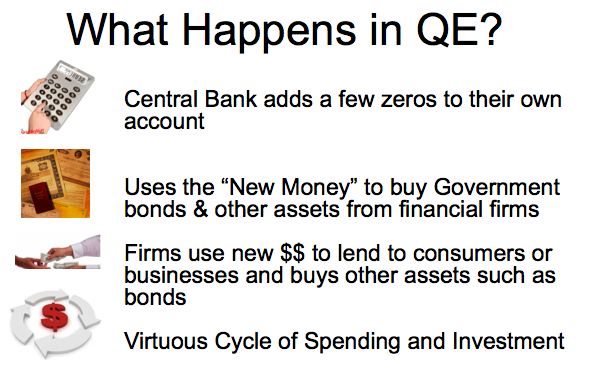|

Federal Reserve May Pause Quantitative Easing
An obscure report that the Federal Reserve may suspend
the monetization of purchasing Treasury Bonds has the smell of disinformation. The perennial efforts to lift economic spirits
with the beginning of a New Year often are packed with wishful thinking. Quantitative Easing is being treated as a useful
tool for turning on and off the spigot of liquidity infusion. In reality, the results of the massive origination of debt created
monies fundamental purpose is to save the commercial banks from insolvency. The trial balloon report, Federal Reserve could pause QE this
year if US economy improves, avoids the risks that come from another expansive round of deficit spending.
"St. Louis Fed President James Bullard, a voting
member of the Fed's monetary policy panel this year, said a drop in the unemployment rate to 7.1 per cent would probably constitute
the "substantial improvement" in the labor market that the central bank seeks. "If the economy performs well in 2013, the Committee will be in a position to think about going on pause"
with the asset buys. Minutes from their December policy meeting
showed that "several" top officials expected to slow or stop the so-called quantitative easing program, dubbed QE3,
"well before" the end of the year - news that surprised some on Wall Street and prompted a drop in stocks and bonds,
and a rise in the dollar."
The recent spike
of equity prices after the sharp increase in taxes on high-end incomes just does not translate into improving the prospects
of the beleaguered middle class. Temporary uncertainty relief does not make a healthy stock market alone. When the financiers
of employment expansion must face the added costs of Obamacare and a drop in consumer disposable income, it simply does not
follow that unemployment levels will drop in the near future. Yet,
segments of the Federal Reserve offers optimism, as the labor market may show "substantial improvement" in the coming
months. Could this forecast imply some newfangled governmental make work new spending programs?
"AIG has just launched a two-week, multimedia campaign seeking to reintroduce itself after its role in sparking
the Great Recession," MediaPost reported yesterday. "The company got an $85 billion bailout as the government took about an 80% stake."
The ballyhoo over paying back the
loans steers clear of the real reason why AIG was "Too Important" to fail; namely, to salvage the incalculable derivative
obligations. Rescuing the money center banks has always been the intent of the "Too Big to Fail" taxpayer salvage
schemes. But when will the limit of such gifts be reached? When the banks are satisfied or when
the Treasury is emptied and looted, as the cost of extending the usury based financial system. Future generations do not have
a chance for economic prosperity as long as the Federal Reserve continues the bond-buying thievery. In order to confuse the public even more, The Big Banks Expect Quantitative Easing Into Early 2014. "The New York Fed’s primary dealers, the 21 banks with which
it carries out transactions, expect quantitative easing to continue until 1Q 2014. This is according to a Dow Jones Business
News report. The recently released minutes of the December FOMC meeting revealed that several Fed governors were taking a more hawkish stance in regards to the bond-buying program."
Remember that the Fed is forecasting a slow modest recovery. What will the change in
attitude become with a serious double-dip recession? Do not believe for a New York minute that
the Fed is looking to transition out of their gravy train financial backdrop for their bankster holders of the privately
owned central bank. The practical gauge of how long Quantitative Easing remains will be decided
by the amount of debt that needs to be refinanced. Rolling over current debt is easy enough of a concept to understand. Should
it not be just as comprehensible to recognize that continued increases in the national debt requires even greater appetites
to buy government bonds? Notwithstanding, this normal mechanism of finance, the perverse imagination
of the paper printers knows no bounds. The Trillion-Dollar Platinum Coins provides the latest absurdity. "There’s a legal loophole allowing
the Treasury to mint platinum coins in any denomination the secretary chooses . . . Yes, it was intended to allow commemorative
collector’s items—but that’s not what the letter of the law says. And by minting a $1 trillion coin, then
depositing it at the Fed, the Treasury could acquire enough cash to sidestep the debt ceiling—while doing no economic
harm at all."
In response, Rep. Greg Walden (R-Ore.) has introduced a bill to specifically ban President Barack Obama from minting the coins. The obvious conclusion when the market refuses to support low interest T Bonds is that something has to give. Either
interest rates need to rise significantly or the Fed must continue their Quantitative Easing.

As long as the Obama administration maintains, We Do Not Have a
Spending Problem, and stonewalls significant and meaningful reductions in the federal
expenditures, the national debt will continue to be a drain on the financial bond markets. Mr. Bullard’s optimistic projection of lower unemployment might simply be a signal
that the methods for compiling the statistics may be in the works. The main street economy sees no benefit from a banking
system that shuns loaning money to productive businesses. Quantitative
Easing in any form or machination is a euphemism for crony corporate welfare. The big money center banks are virtually financially
immune from lawful accountability or criminal prosecution. Slapping
fines and penalties for violating statues and regulations, results in escaping trial by juries. This basic exclusive protection
for the elites that run the counterfeit presses is the proof of true power. Inexhaustible Quantitative Easing is just another
means to keep the spending financed with other peoples’ money. James
Hall – January 9, 2013
Discuss or comment about this essay on the BATR Forum
|

